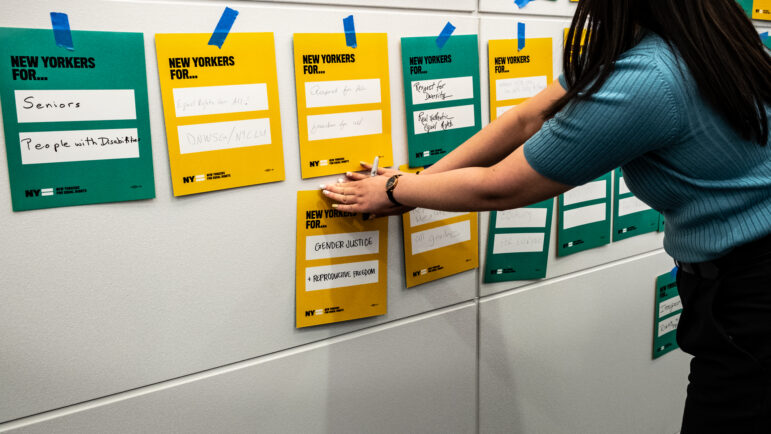“TGE Means Affordable Housing and a Park.”
That heading on correspondence got the attention of Brooklyn Community Board 1 last month. TransGas Energy Systems has been reviled in Williamsburg and Greenpoint for its plan, first filed in 2002, to build a $1.3 billion, 1,100-megawatt power and steam cogeneration plant on the East River waterfront, at the foot of North 12th Street.
Community leaders and the Bloomberg administration came out strongly against TransGas’ plans. But at a meeting with community board members on February 3, TGE presented a new face to the neighborhood: as a benefactor delivering $50 million for the development of affordable housing.
The Manhattan-based company also presented its revised plan for the cogeneration plant. Though there will be a tall smokestack, the facility itself will be buried 100 feet underground and topped by a seven-acre park. “If Community Board 1, after reviewing the amended Application, believes it can actively support the project in all its licensing activities, then it may be worthwhile for TGE and Community Board 1 to enter into negotiations to reach agreement on the commitment of $50 million for affordable housing,” read a letter sent to board chair Vincent Abate by TGE principal Adam Victor on January 17.
The cash offer comes in the middle of a hot debate on housing in Williamsburg and Greenpoint. The industrial waterfront is being rezoned to make way for new luxury apartment towers, and the Bloomberg administration plans to offer developers incentives to make anywhere from 15 to 25 percent of new apartments affordable to low- to middle-income occupants. A coalition of community, housing and religious groups, meanwhile, wants the city to require all developers to include some affordable housing. TranGas says it’s doing its share to help make such mandates feasible. “There will be more than incentives—there will be cash,” said Sam Laniado, an Albany attorney representing TransGas. “The neighborhood gets open park space and affordable housing, the city gets a badly needed power plant, and it’s the most environmentally controlled, unobtrusive power plant ever built.”
“They’re trying to buy off the community,” counters Adam Perlmutter, a member of Community Board 1 who is also legal counsel to Greenpoint Landing Associates, a developer planning to build on the waterfront. “They’re trying to throw as much money as possible at the community in order for the community’s opposition to dissolve and the city’s opposition to dissolve.” TransGas technically only needs the state Public Service Commission to approve its application. But the company will also have to rely on city government to take essential measures, like providing easements for water and steam tunnels.
TransGas has also just lost an important political ally: organized labor. According to a source in the building trades, many of the construction unions that had advocated for the power plant project recently decided to back the Bloomberg administration’s waterfront plans instead.
Community Board 1 is weighing the offer, and some local advocates suggest that the prospect of community groups favoring the power plant could give them leverage as they seek affordable housing mandates from the administration. “TGE raises potential wild cards in this whole discussion,” said Martin Needelman, executive director of Brooklyn Legal Services Corporation A and a leader of the coalition Mobilization Against Displacement. “People know that the TGE plan would stop the luxury housing on the waterfront.”








